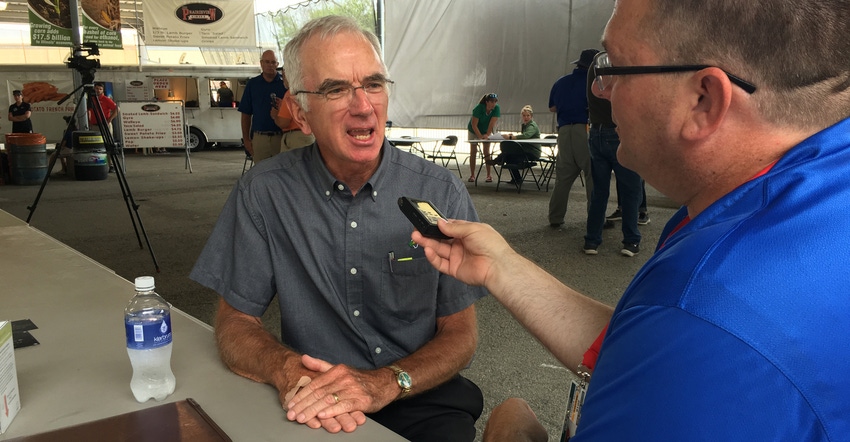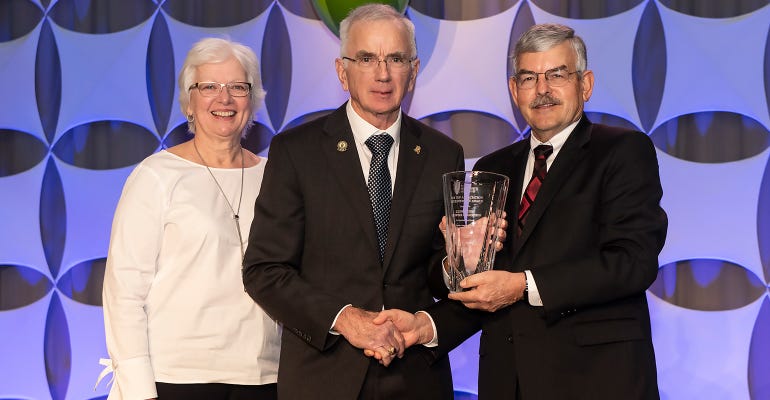
It’s not often an Illinois farmer finds himself thrust into the hot lights of national news, but Ted Mottaz did four years ago. He happened to be lobbying Congress on behalf of IL Corn on the day former Rep. Aaron Schock resigned, and not only was Ted in Washington, D.C., but he was right outside Schock’s office. Before he knew it, he had cameras in his face and was offering commentary on the young congressman’s resignation, airing from coast to coast.
“That was my 15 minutes of fame,” Ted says, laughing. “And on national news!”
What’s it all mean for an Elmwood, Ill., farmer who’s taught agriculture, farmed for the past 36 years, and now serves as president of IL Corn? In this interview with Prairie Farmer, learn how Ted has developed young people, built consensus and led with honor.
Where did life start for you? I was born north of Elmwood; then we moved to Victoria in the mid-1950s. By 1963, my grandfather asked us to move to Yates City, and that’s where the farm’s been ever since. My dad was a grain and livestock guy. It was the era that soybeans were something new to raise. He used to say he didn’t need electric augers at the bunks — that’s what he had three sons for!
How did your dad’s farming career influence you? Dad and my grandfather were real progressive when it came to equipment. In 1960, we had a four-row combine. That was unheard of. They were progressive to the point that when autosteer came in, we were one of the early ones in the county to have it — and now we can’t drive without it.
Did you always want to farm? In high school, I was chosen as most likely to be college-bound, and probably a science teacher. It was a time when there wasn’t room for me. I wanted to be a farmer, but I didn’t see it happening until after I started teaching, and we were able to do things together.
I graduated in 1966, got a degree in ag education from Western Illinois University, got drafted into the Vietnam War, then I got a master’s and a job at ROWVA High School. I taught there from 1973 to 1979; then I took a job teaching agriculture at Carl Sandburg College.
The first year I started farming was 1983 — a drought year — and my 80 acres of corn averaged 97 bushels. When I left Sandburg in 2002, I was a full-time farmer.
What’s the snapshot of the farm today? Brother Jeff and I operate the farm, and we raise corn and soybeans. Jeff runs machinery, and I do logistics. Dad’s in the nursing home, but he still communicates with us about the farm and offers suggestions.
You’ve held a variety of positions in life, from ag education to farmer. How have you known when it was time to make a change? I made the move to the community college level because I liked to take a student who maybe didn’t think college was for them, and show them two directions to go: either two years of school, then work; or two years of school, then transfer to a university. [Dean] Chuck Olson was a great partner at the University of Illinois. Anybody that wanted to go to Illinois could do it. A lot of them grew up a whole bunch in that two-year time.
You’ve spent a lot of years in education and in developing young people. Are there traits you see in a young person that make you think they’re going places? Their ability to stay on task. Their ability to build good relationships with other people. They’re constantly trying to achieve at a high level. And they’re willing to take evaluation. I couldn’t guarantee that the success is going to be there, but those are some promising indicators.

SUCCESS: Asked what he does that’s directly tied to his success, Ted demurs. “Don’t be braggy. Try not to intimidate people. Try to understand all the sides. I’m not the guy screaming at the board meeting. And I’m willing to say yes.”

You’re the current president of IL Corn. What are you learning during your time in this role? Ethanol is at a turning point. Last spring, the auto people were with us in Washington, D.C. The vice president of power units and transmissions from GM said, “We’ve got to have a higher grade of octane in our gas, because we’re going to have engines by 2025 that will be very high compression ratio, and we need higher-octane fuel. High octane, low carbon.” And he said, “If we don’t get that, we’re heading right to electric.” So the fear there is electric. As ethanol producers, we have to sit up and take notice now: We have to do all we can to get this back.
We’re in the middle of a trade war on a number of fronts; how problematic is that for Illinois corn growers? With the market being so unstable, we don’t know where to go. What disturbs me is getting younger people in the business, and we want to keep them in the business. But it’s unstable, and we have less people out there willing to do it.
Do members of Congress understand how instability affects agriculture? I think the congresspeople from our area do. But we have to keep working to educate our office holders and all the staffers that surround them. We can’t let up.
You’ve made a career of working with people: in education, on a family farm, now in a major commodity organization. How do you build consensus in a group? I try to build interaction. Converse and debate and bring in experts. That’s the beauty of an organization like IL Corn. We have experts like Dave Loos to help us out. Our IL Corn staff people really provide us with expertise.
And on the farm? Well, that’s harder sometimes. I try to get us to a situation where nobody is mad. I try to get people to see both sides, to look forward and don’t dwell on what happened in 1982. Bring everybody in together. No secrets. Personalities are tough to read sometimes. I try to keep an open mind and a positive attitude.
In your life, what did you not see coming? Going to war. I never saw that coming. I was drafted in February 1971 and went to Da Nang, Vietnam. I came home December 1972. We were the last infantry battalion to leave Vietnam.
I couldn’t imagine going to a place when you were in harm’s way. I went there very naive. You don’t know what it’s like, being shot at. I never even paid any attention to the protests, because I thought it would never affect me. Then when I got out, I understood why they were protesting.
What lessons did you want your kids to take away from their time at home? I wanted them to be kind to people. I wanted them to work hard and to enjoy life. When my son, Phillip, was younger, he wanted to go to New York or Hollywood to seek his fortune as an improv comedian and writer. He asked me and I said, “Here’s the deal: I don’t want to see you at 40 or 45 years old and say, ‘I wish I would’ve tried.’’’ So that’s what he did, and he has a good day job. And Emily — I didn’t have to do much at all, just get out of her way!
We never had curfews. We just wanted them to know what’s right and wrong. And I hope the same goes for their kids.

HONORED: Ted and his wife, Janet, accept a membership recruitment award on behalf of IL Corn during the 2019 Commodity Classic, presented by Lynn Chrisp (right), Nebraska farmer and National Corn Growers Association president.

MOTTAZ REFLECTS
On family farming:
“I got where I wanted to be as far as acreage and equipment. But my ability to farm was definitely aided by farming with my dad, brother and grandfather.”
On leadership:
“Another problem in my career is that I never fully understood the word ‘no.’ That’s landed me as president of a lot of organizations.”
On solving problems:
“I don’t like to argue. I support, analyze the situation, know the background, then ease into it. Communicate and be open to both sides. Negotiate. Don’t take too hard of a political stand.”
On D.C.:
“Our visits to Washington are eye-opening. You wonder how anything ever gets done.”
On Illinois ag:
“You get to know how different our state is from one end to the other.”
On becoming a sergeant:
“One of my goals was to be a sergeant when I got out of Vietnam, and to do that I had to get my combat infantry badge, which meant I had to get shot at. Turns out, I got that the first night I was there.”
MOTTAZ IN BRIEF
Truck? Chevrolet and Kenworth
Tractor? John Deere
Livestock? Always wanted a herd of Herefords
Technology? Autosteer
Book? “Faith of My Fathers” by John McCain
Best decision? Marrying Janet
Hobby? Car care, including a teal Corvette
Family? Wife Janet, son Phillip and daughter-in-law Rachel, daughter Emily and son-in-law Joe, seven grandchildren
Best advice? Be kind to people.
About the Author(s)
You May Also Like






